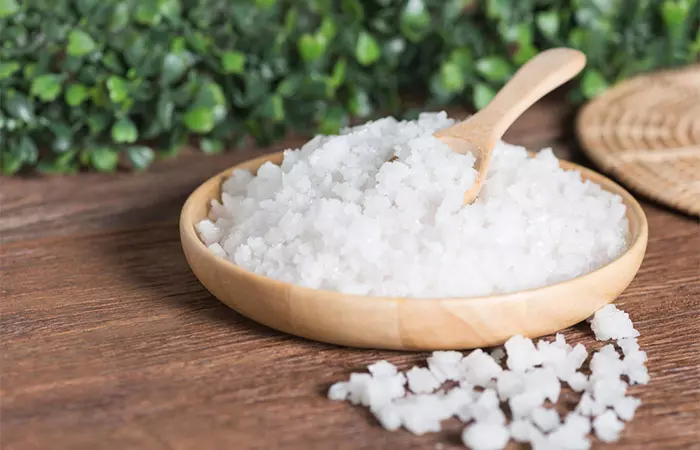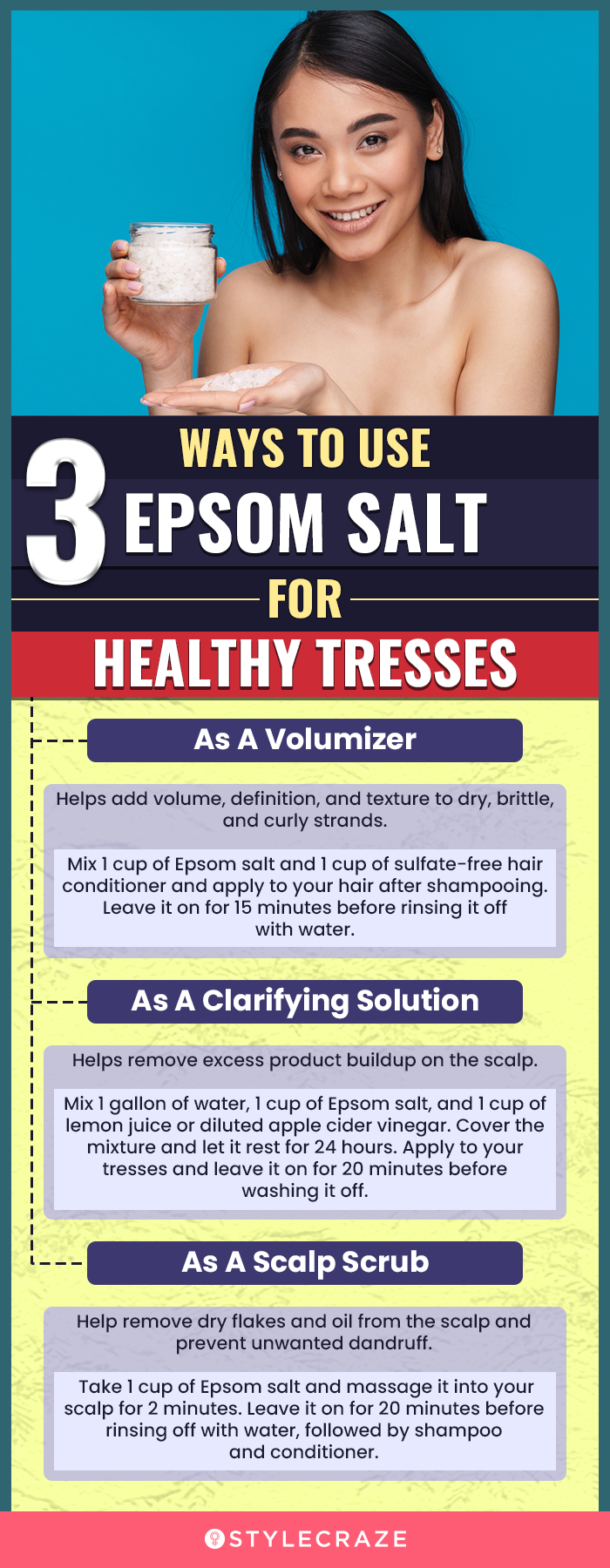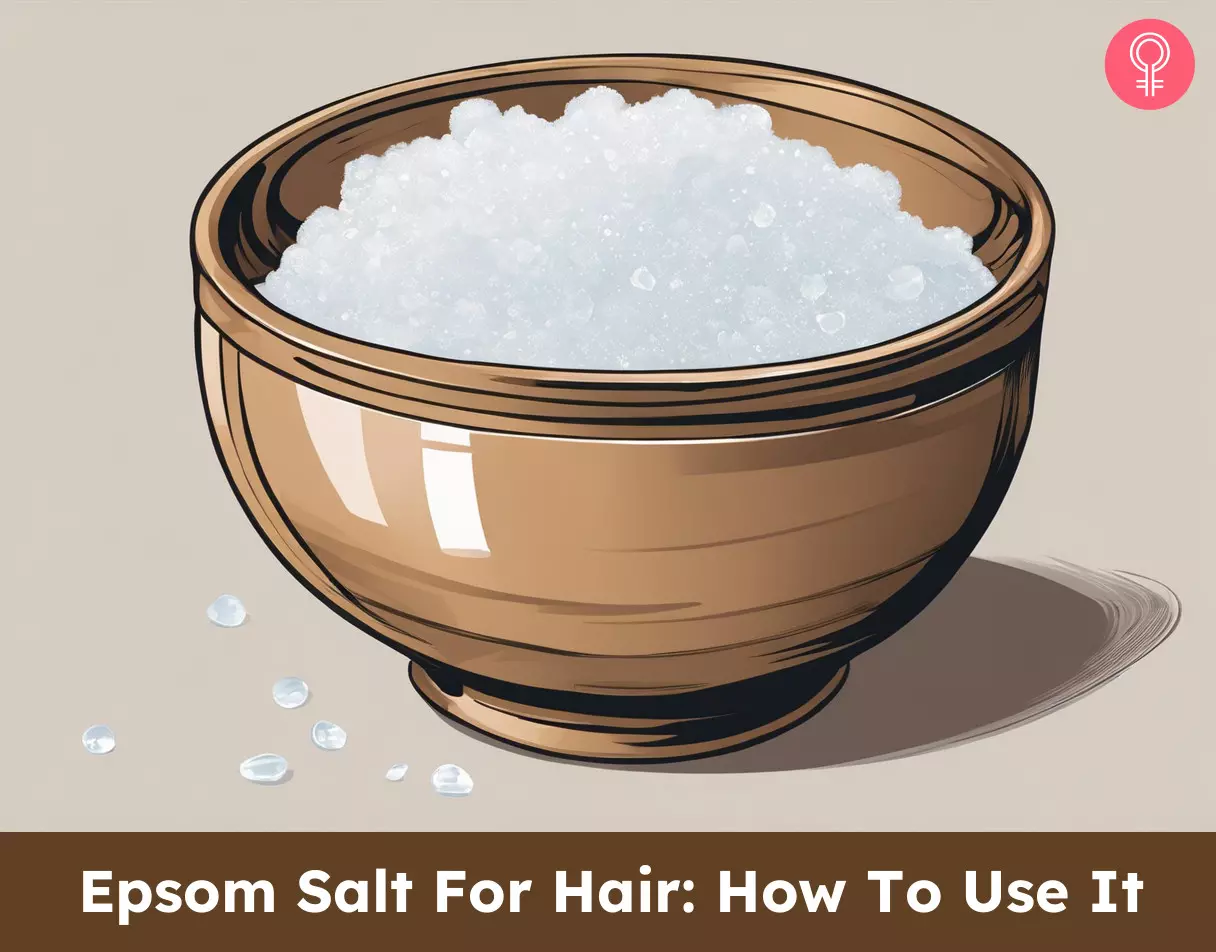Composition Of Epsom Salt
Epsom salt is made up of: Colorless, crystalline powder made of magnesium, oxygen, and sulfur What Are Its Benefits? Removes excess oil from the scalp, enhances hair texture, adds volume to hair, and helps manage dandruff. Who Can Use It? People with dandruff and itchy scalp or individuals with fine hair How Often? Once a month to treat dandruff and once every two weeks for oily hair Caution Avoid using it on your hair if you have recently undergone any chemical treatments like perming or coloring. Give your hair some time to recover.
Magnesium (Mg) Sulfur (S) Oxygen (O) Water (H2O)
These elements play a role in various biochemical processes of the human body. The water molecules are called “water of hydration” and are not chemically bonded to the compound. Instead, they are responsible for the crystalline form of Epsom salt, giving it a salt-like appearance. However, Epsom salt is technically not a salt, but simply a mineral compound named after a saline spring called Epsom in Surrey, England. Epsom salt has various traditional household uses and is quite popular for its therapeutic, rejuvenating properties as bath salts for exfoliation and sore muscle treatment. Keep reading to know more about its uses in hair care.
Is It Safe To Use Epsom Salt For Hair?
Yes, it is safe to use Epsom salt for your hair and scalp. It is a naturally occurring chemical compound made of magnesium, sulfur, and oxygen – elements already present in the human body. Epsom salt is also known as magnesium sulfate. According to the Cosmetic Ingredient Review (CIR) expert panel, Epsom salt or magnesium sulfate does not have any toxicity concerns. They concluded that accidental inhalation of Epsom salt in the form of sprays and topical application on skin and hair does not cause any adverse health hazard and is non-irritating (1). Epsom salt is very different from regular table salts and sea salts as it has a different chemical structure. It is termed “salt” because of its texture and salt-like appearance. It is traditionally used to manage sprains, muscle pain, insomniai A common sleep disorder characterized by trouble falling and staying asleep due to poor sleeping habits, anxiety, or illness. , and fibromyalgiai A chronic condition characterized by muscle pain, trouble sleeping, fatigue, and emotional and mental distress. . While none of its benefits are scientifically studied, anecdotal evidence claims that Epsom salt is beneficial in addressing these ailments. Also, as a natural remedy, it can be used as a beauty treatment for your tresses. It may aid in hair strengthening and provide scalp and hair nourishment. Epsom salt is widely used as a hair volumizer and hair and scalp spray. When dissolved in warm water, this salt can be used as a hair detoxification treatment and remove product buildup, which may hinder hair growth. The possible reason is that Epsom salt removes oil from the hair and scalp, reducing greasiness. Salt sprays also impart texture to the hair, adding natural waves and giving the strands a slightly crunchy texture. Many people want to know how to treat dandruff with salt. Anecdotal evidence claims that Epsom salt sprays may also help curb dandruff and improve scalp health. Dandruff is caused by Malassezia, a yeast-like fungus that feeds on the sebum and lipidsi Fatty substances that make up a small part of your hair’s overall weight and play a role in keeping your hair shiny and healthy. on your scalp. Epsom salt may reduce the excess grease, managing the proliferation of the fungus and helps in dandruff relief. That is one possible explanation for why it may work, although there is no scientific data to support this claim.
How To Use Epsom Salt For Your Hair
1. As A Volumizer
This is perfect for oily, dry, and curly hair. It will add volume and texture to the hair and define the curls without stripping excess moisture from your locks. You Will Need
1 cup of Epsom salt 1 cup of sulfate-free hair conditioner
Method
2. Clarifying Solution
If you use hair styling products, you can use this Epsom salt solution to remove excess product buildup and clarify your locks and scalp.You Will Need
1 gallon of water 1 cup of Epsom salt 1 cup of lemon juice or apple cider vinegar (diluted)
Method
3. Epsom Salt Scalp Scrub
Epsom salt has a rough texture. It can help remove excess oil and dry flakes from the scalp to manage dandruff. You Will Need
1 cup of Epsom salt
Method Melissa Bourget, a YouTuber, shared her experience with an Epsom salt scalp scrub for buildup in her video. She uses an oil mixture with Epsom salt and gently rubs it on the scalp. About the results, she says, “My scalp feels super fresh and clean and it just feels good and I don’t feel any itch at all (i).” Does Epsom salt make your hair curly? Epsom salt (magnesium sulfate) has been used in many curl enhancers or leave-in conditioners. It is known for its natural curl-boosting properties. Does Epsom salt soften hair? Topical application of Epsom salt doesn’t soften your hair. Also, there are no studies to support these claims. However, Epsom salt, along with a conditioner, may help soften hair. Is Epsom salt good for itchy scalp? Anecdotal evidence suggests that massaging your scalp with Epsom salt may help relieve itchiness. However, limited data is available in this regard. Does Epsom salt water thicken hair? Epsom salt water may thicken your hair and add texture to it. However, there are no studies to support these claims.
Illustration: Epsom Salt For Hair: How To Use It
Epsom salt is a versatile and affordable home remedy. Watch this informative video and discover 20 brilliant ways to incorporate it into your daily haircare regimen.









